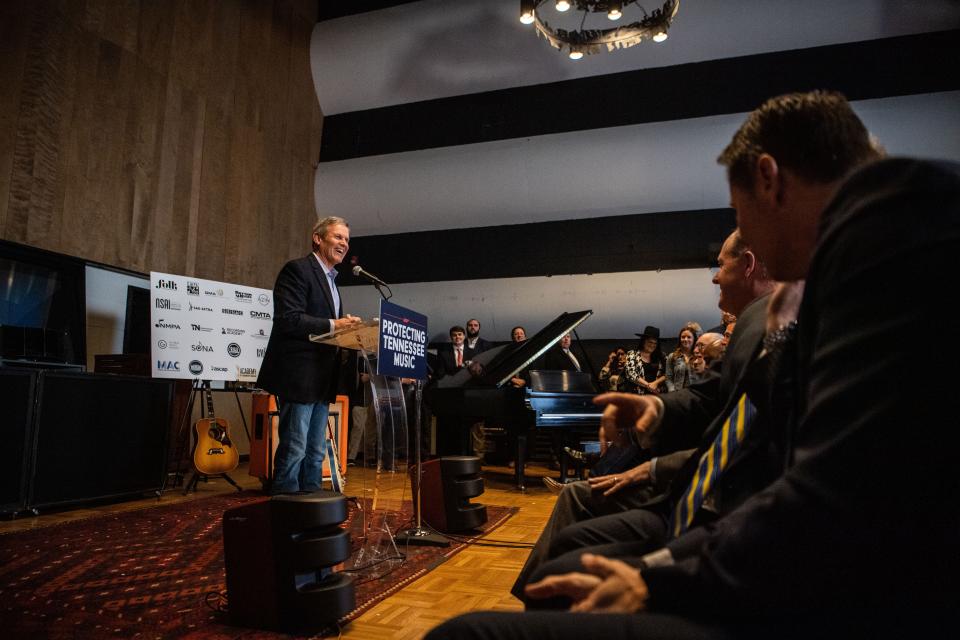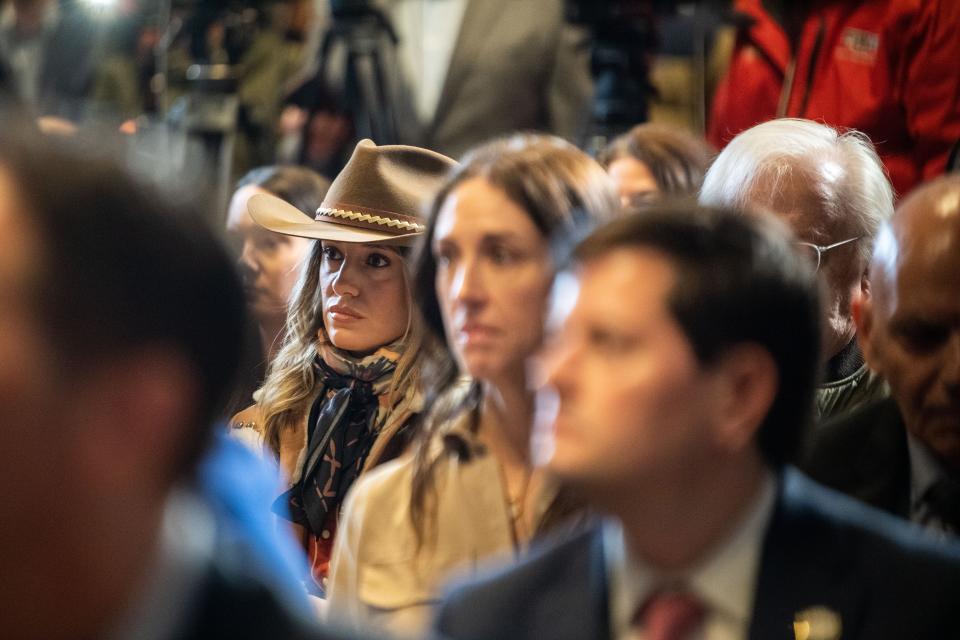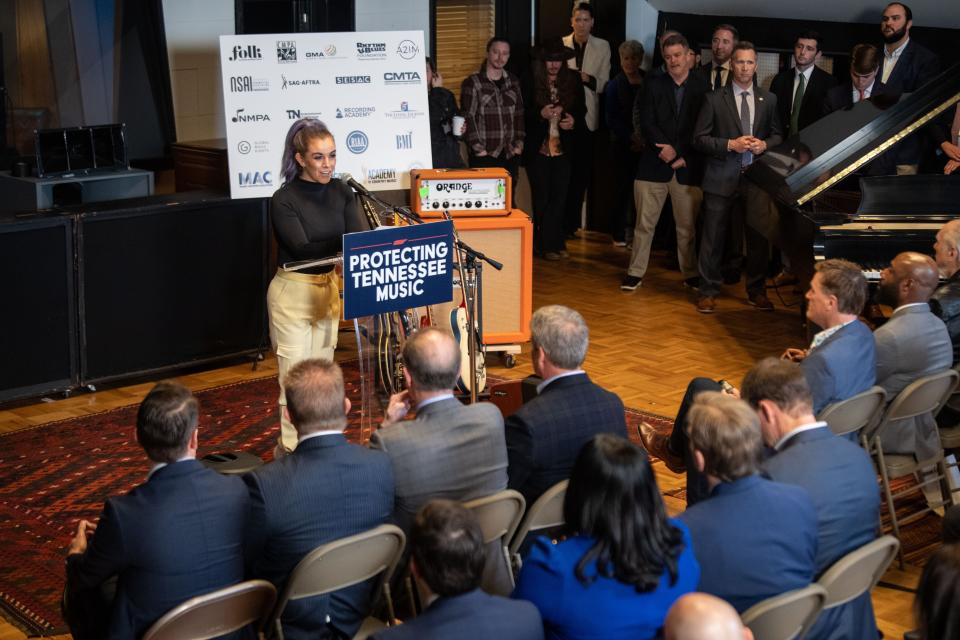Gov. Bill Lee proposes 'ELVIS Act' to protect musicians, songwriters from misused AI
Tennessee Governor Bill Lee announced plans Wednesday to propose a bill aimed at protecting musicians and songwriters from misused artificial intelligence, with an eye at becoming the first state in the nation to adopt such protections.
Lee announced plans for the legislation at Nashville's historic RCA Studio A, before a veritable who's who of musicians, songwriters, music industry leaders ― including CMA Entertainer of the Year Lainey Wilson, songwriter Jamie Moore, Maggie Rose, Matthew West and Tom Douglas.
"This is really a piece of legislation that will protect voices from technology from artificial intelligence that actually rob and steal an artist's gift," Lee told reporters after the announcement event.

"We hope it'll be a blueprint for the country," he continued. "The music industry is incredibly important, obviously, to our state. We're the music capitol of the world ― and we need to lead in protecting these artists."
As artificial intelligence continues to develop, new technologies can create "deepfakes" of your favorite musical artists, digest their works and create similar ones, imitate their voices, write lyrics, generate beats and compose entirely original melodies.
Lee told reporters that he hopes to work alongside actors in the technology industry to ensure that AI is used as intended, and not to boost bad actors.
"Artificial intelligence is an important tool when used effectively and used right. It advances industries of all kinds," Lee said. "But in the hands of the wrong player ― in the hands of someone who is attempting to steal an artist's gifting, their voice, their likeness, it's important to protect them."

Lee's planned legislation, which will be called the Ensuring Likeness Voice and Image Security (ELVIS) Act, will add artist's voices to the state's Protection of Personal Rights law. Lee said that the planned legislation was developed with significant input from music industry leaders.
The bill can be criminally enforced by district attorneys as a Class A misdemeanor. Artists—and anyone else with exclusive licenses, like labels and distribution groups—can sue civilly for damages.
Many representatives from industry groups attended the announcement. According to the governor's office, the governor's legislation is supported by: Academy of Country Music, American Association of Independent Music, The Americana Music Association, American Society of Composers, Authors and Publishers (ASCAP), Broadcast Music, Inc. (BMI), Church Music Publishers Association (CMPA), Christian Music Trade Association, Folk Alliance International, Global Music Rights, Gospel Music Association, The Living Legends Foundation, Music Artists Coalition, Nashville Musicians Association, National Music Publishers’ Association, Rhythm & Blues Foundation, Screen Actors Guild – American Federation of Television and Radio Artists (SAG-AFTRA), Society of European Stage Authors and Composers (SESAC), Songwriters of North America (SONA), and the Tennessee Entertainment Commission.
“As AI technology continues to develop, today marks an important step towards groundbreaking state-level AI legislation," Recording Academy CEO Harvey Mason, Jr. said in a statement.
"This bipartisan, bicameral bill will protect Tennessee’s creative community against AI deepfakes and voice cloning and will serve as the standard for other states to follow."
Specifics of Lee's bill are not yet available, as the legislation is not yet filed.
House Majority Leader William Lamberth, R-Portland, and Senate Majority Leader Jack Johnson, R-Franklin, will sponsor the bill. Counterparts in Congress, including Sen. Marsha Blackburn, are working to push similar legislation on the federal level.
“While the rapid advancement of artificial intelligence is exciting in many ways it also presents new challenges ― especially for singers, songwriters and other music professionals," Johnson said in a statement. "It is crucial our laws protect these artists from AI-generated synthetic media which threatens their unique voices and creative content.”

Canadian singer-songwriter Lindsay Ell thanked lawmakers for working to establish protections for the industry. "No one wants to hear their voice or see their image taken without permission or used out of context," Ell said.
"This landmark legislation will help protect artists against those threats and set the stage for protection nationally and around the world."
Tennessee’s already existing law protects image and likeness from artificial intelligence. Lee said his bill will update state law to "include protections for songwriters, performers, and music industry professionals’ voice from the misuse of artificial intelligence."
The music industry supports more than 61,617 jobs in Tennessee, and contributes $5.8 billion to the state's gross domestic product (GDP).
"We have more workers in Tennessee in the music industry than any other state, and so when when technology disrupts in a negative way -- when it impacts those workers in a negative way ― it's really important to all of us," Lee said.
"That's what drove this. This is a threat to an industry that has made Tennessee globally known... Whenever that industry is threatened, then we should step in and look for ways to eliminate that threat. That's really what this was about."
Current federal AI protections for musicians
Current laws state that studios can still use and create AI generate music, but in order for a song or lyrics to be protected under copyright, it must be original. It cannot be copyrighted as an original work by an AI.
In October 2023, Senators Chris Coons, Marsha Blackburn, Amy Klobuchar and Thom Tillis introduced a draft federal bill aiming to "protect the voice and visual likeness of all individuals from unauthorized recreations from generative artificial intelligence (AI)."
The "No Fakes Act" is a bipartisan proposal taking a swing at generative AI by protecting musicians' rights and addressing non-consensual digital replicas of art and artists.
Performers' Rights Organization ASCAP is also working on Capitol Hill to protect musicians by meeting with members of Congress to advocate for musicians' rights.
The U.S. Copyright Office is conducting a study regarding copyright and generative AI, to which ASCAP submitted responses and comments in November and December. ASCAP also replied with submitted comments reacting to the perspectives offered by AI companies.
Vivian Jones covers state government and politics for The Tennessean. Reach her at [email protected]. Audrey Gibbs covers music for The Tennessean. Reach her at [email protected].
This article originally appeared on Nashville Tennessean: AI in music: TN Gov. Lee proposes bill to protect music artists
